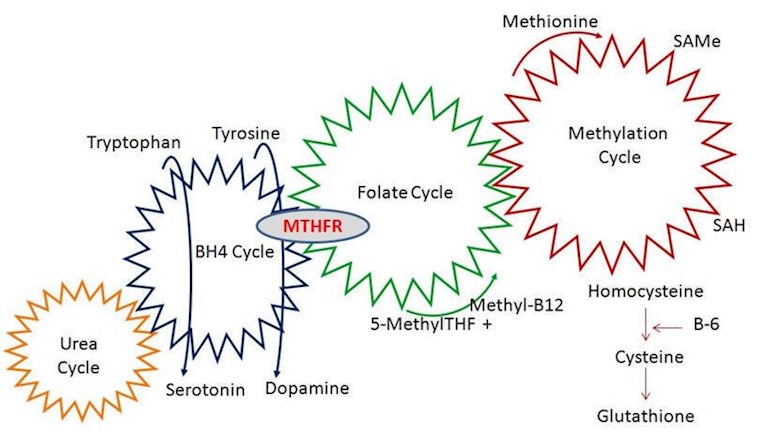Tetrahydrobiopterin (BH4, sometimes THB) is a vital cofactor for numerous enzymes in the body, including those involved in the formation of nitric oxide (NO), and the key neurotransmitters dopamine, serotonin and epinephrine.
What is Tetrahydrobiopterin (BH4) and How... - Cure Parkinson's
What is Tetrahydrobiopterin (BH4) and How Can I Make More of it?

What Decreases BH4?
Heavy metals such as Mercury, Lead, Aluminum and Iron
High protein diet
Hydrogen peroxide
Hyperammonia
Inflammation
Methotrexate, which inhibits DHFR
Oxidative Stress/Damage
Peroxynitrite
Sun/UV
The mutations listed above
What Increase BH4?
Chronic Pain (adaptive response)
Exercise
Far-Infrared
Fenofibrate
Folate/Methylfolate is a potent peroxynitrite scavenger
Losartan
Nitrites
Royal Jelly
SAM-e
Statins/HMG-CoA reductase inhibitors
Vitamin C
Here is a summary of the BH4-related biochemical transformations:
Phenylalanine hydroxylase (PAH) enzyme to convert Phenylalanine (PHE) to Tyrosine (TYR)
Tyrosine hydroxylase (TH) enzyme to convert Tyrosine to L-DOPA (DOPA)
Tryptophan hydroxylase (TPH) enzyme to convert Tryptophan to 5-Hydroxytryptophan (5-HTP)
Nitric oxide synthase (NOS) enzyme to convert a Arginine (ARG) to Nitric oxide (NO)
The enzyme DHFR may recycle BH2 into BH4.
This would be after exogenously administered BH4 has been oxidized into BH2.
Nitric Oxide Production
BH4 is important for nitric oxide synthases and when it is missing, enzymes become "uncoupled". This uncoupling produces Reactive Oxygen Species (ROS) rather than NO.
Neopterin/Biopterin Profile (Urine) Test. It’s very complicated pathway and one can’t simply supplement with BH4.